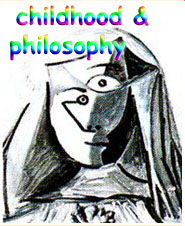philosophising with young children as a language-promoting principle
DOI:
https://doi.org/10.12957/childphilo.2019.42556Keywords:
philosophy with children, picture books, language-promotionAbstract
Children develop language and communication skills through interaction with adults and other children. This study therefore focuses on two interdependent issues: the effect of philosophizing with children on children’s language development and the speech acts of teachers and children in philosophical enquiries. As part of a before-after test with the “Hamburger Verfahren zur Analyse des Sprachstandes Fünfjähriger” (Reich & Roth, 2004, Hamburg Procedure for Analysing the Language Level of Five Year-olds), weekly philosophical discussions were undertaken with a test class over a period of six months. The central findings are that the philosophising children developed significantly higher language ability compared with a non-philosophising control class in two areas, namely general performance in discussion and the use of more sophisticated connectors. A further part of the study compared the speech acts of the children and their pre-school teacher in the context of philosophical discussion with their speech acts in a different dialogic situation (dialogic discussion of picture books). This showed that philosophical questions from the pre-school teacher led to the production of particularly complex language by the children. Complex speech acts involve the use of higher-level verb structures and connectors. These are necessary in order to reason and act as a citizen agent and are supported by philosophising with children, as this study shows.
Downloads
References
Brüning, B. (2010). Philosophieren in der Grundschule: Grundlagen, Methoden und Anregungen. Berlin: Cornelsen Scriptor.
Daniel, M.-F., Lafortune, L., Pallascio, R., & Schleifer, M. (1999). Philosophical Re-flection and Cooperative Practices in an Elementary School Mathematics Class-room. Canadian Journal of Education 24 (4), 426-440.
Daniel, M.-F., Pettier, J. C., & Auriac-Slusarczyk, E. (2011). The Incidence of Philoso-phy on Discursive and Language Competence in Four-Year-Old-Pupils. Creative Education, 2 (3), 296-304.
Daniel, M.-F., & Delsol, A. (2005). Learning to dialogue in Kindergarten. A Case Study. Analytic teaching, 25 (3), 23-52.
de Boer, H., & Fuhrmann, C. (2015). Mit Bilderbüchern philosophieren. In M. Dehn & D. Merklinger (Eds.), Erzählen – Vorlesen – zum Schmökern anregen. Frankfurt a.M.: Grundschulverband, 165-176.
Ennemoser, M., Kuhl, J., & Pepouna, S. (2013). Evaluation des Dialogischen Lesens zur Sprachförderung bei Kindern mit Migrationshintergrund. Zeitschrift für Pädagogische Psychologie 27 (4), 229–239.
Feilke, H. (2013). Bildungssprache und Schulsprache. In M. Becker-Mrotzek, K. Schramm, E. Thürmann & H.J. Vollmer (Eds.), Sprache im Fach. Sprachlichkeit und fachliches Lernen. Münster: Waxmann, 113–130.
Gholamhossein, S., & Siamak, S. (2010). The development of L2 speaking skills and the related components: Insight from philosophical questions. Procedia - Social and Behavioral Science, 5, 716-721.
Haynes, J., & Murris, K. (2012). Picturebooks, Pedagogoy and Philosophy. London: Routledge.
Heller, V., & Morek, M. (2015). Unterrichtsgespräche als Erwerbskontext: Kommuni-kative Gelegenheiten für bildungssprachliche Praktiken erkennen und nutzen. Re-trieved from http://www.leseforum.ch/myUploadData/files/2015_3_Heller_Morek.pdf
Hering, J. (2010). Leerstellen und das Denken in Möglichkeiten. Bilderbücher und Phi-losophieren mit Kindern. Grundschulunterricht Sachunterricht 1, 11-15.
Hövelbrinks, B. (2014). Bildungssprachliche Kompetenz von einsprachig und mehr-sprachig aufwachsenden Kindern. Eine vergleichende Studie in naturwissenschaftlichen Lernumgebungen des ersten Schuljahres. Weinheim/Basel: Beltz Juventa.
König, A. (2006). Dialogisch-entwickelnde Interaktionsprozesse zwischen ErzieherIn und Kind(ern). Eine Videostudie aus dem Alltag des Kindergartens. Universität Dortmund: Dissertation.
König, A. (2012). Interaktion als didaktisches Prinzip. Bildungsprozesse bewusst be-gleiten und gestalten. Schaffhausen: Schubi Lernmedien AG.
Martens, E. (1999). Philosophieren mit Kindern. Eine Einführung in die Philosophie. Stuttgart: Reclam Verlag.
Martens, E. (2002). Philosophieren als elementare Kulturtechnik. In I. Schneider-Wöfinger, & M. Viertel (Eds.), Philosophieren mit Kindern als vierte Kulturtechnik. Hofgeismar: Evangelische Akademie, 9-22.
Michalik, K. (2006). Zur Methodik von Nachdenkgesprächen. Grundschule Sachunter-richt, 31, 7-11.
Michalik, K. (2010). Methoden des Philosophierens mit Kindern. Grundschulunterricht Sachunterricht, 1, 39–44.
Mol, S. E., Bus, A. G., de Jong, M. T., & Smeets, D. J.H. (2008). Added Value of Dia-logic Parent-Child Book Readings: A Meta-Analysis. Early Education & Development, 19, 7 – 26. Doi: 10.1080/10409280701838603
Morek, M. (2011). Explanative Diskurspraktiken in schulischen und außerschulischen Interaktionen: Ein Kontextvergleich. Schweizerische Zeitschrift für Bildungswis-senschaften, 33 (2), 211-230.
Niklasson, J., Ohlsson, R., & Ringborg, M. (1996). Evaluating Philosophy for Children. Thinking: The Journal of Philosophy for Children, 12 (4), 17-21.
Reich H. H., & Roth, H.-J. (2004): HAVAS 5. Hamburger Verfahren zur Analyse des Sprachstandes Fünfjähriger. Hamburg: Landesinstitut für Lehrerbildung und Schul-entwicklung.
Röhner, C., König, K., Hövelbrinks, B., & Archie, C. (2015). Aufgaben kognitiv anre-gender Sprachbildung im Elementar und Primarbereich: Empirische Erforschung pädagogisch-didaktischer Ansätze und Möglichkeiten der Professionalisierung. In K. Liebers, B. Landwehr, A. Marquardt, & K. Schlotter (Eds.), Lernprozessbeglei-tung und adaptives Lernen in der Grundschule. Jahrbuch Grundschulforschung 19. Wiesbaden: Springer Fachmedien, 79-94. Doi: 10.1007/978-3-658-11346-97
Schleifer M., & Courtemanche, L. (1996). The Effect of Philosophy for Children on Language Ability. Thinking: The Journal of Philosophy for Children, 12 (4), 30-31.
Siraj-Blatchford, I. (2009). Conceptualising progression in the pedagogy of play and sustained shared thinking in early childhood education: a Vygotskian perspective. Education and Child Psychology, 26 (2), 77-89.
Spinner, K.H. (2006). Literarisches Lernen. Praxis Deutsch 200, 6-16.
Thompson, A. G., & Dupuis, A. (1979). Bilingual Philosophy in Milwaukee. Thinking: The Journal of Philosophy for children, 1 (1), 35-39.
Tietze, S., Rank, A., & Wildemann, A. (2016). Erfassung bildungssprachlicher Kompe-tenzen von Kindern im Vorschulalter. Grundlagen und Entwicklung einer Ra-tingskala (RaBi). Retrieved from https://core.ac.uk/download/pdf/44744748.pdf
Trickey, S. (2007). Promoting Social and Cognitive Development in Schools: An Eval-uation of “Thinking Through Philosophy”. The 13th International Conference on Thinking, 187-191. Retrieved from http://www.ep.liu.se/ecp/021/vol1/ecp07021.pdf
Whitehurst G. J., Falco, F. L., Lonigan, C. J., Fischel, J. E., DeBaryshe, B. D., Valdez-Menchaca, M. C., & Caulfield, M. (1988). Accelerating Language Development Through Picture Book Reading. Developmental Psychology, 24 (4), 552-559.
Worley, P. (2015). Open thinking, closed questioning: Two kinds of open and closed question. Journal of Philosophy in Schools 2(2), 17-29.
Zevenbergen, A. A., & Whitehurst, G. J. (2003). Dialogic reading: A Shared Picture Book Reading Intervention for Preschoolers. In A. van Kleeck, S. A. Stahl, & E. B. Bauer (Eds.), On reading books to children. Parents and teachers. Mahwah, N.J.: L. Erlbaum Associates, 177–200.




